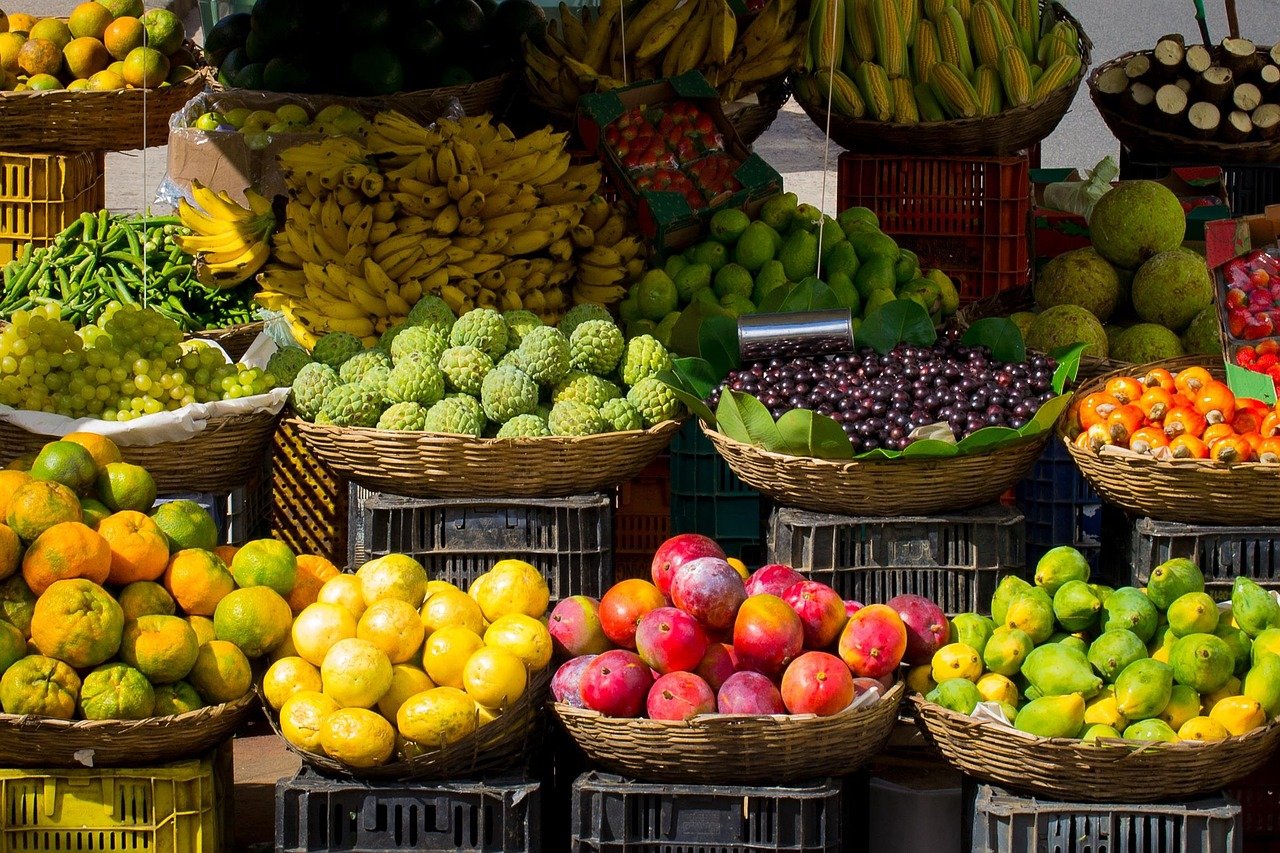Chakula: Basic Swahili Food Vocabulary
In this post we’ll build your Swahili vocabulary by learning about everyone’s favorite language topic: Swahili food terms! Swahili food vocabulary will come in handy no matter why you’re learning Swahili. First we’ll cover some basic expressions related to food. Then we’ll look at vocabulary for meals. Next we’ll see a lot of basic Swahili vocabulary for food and drink. Finally, we’ll wrap up with related vocabulary for utensils and ways to describe your food. Let’s dig in.
Ninahisi njaa! I’m hungry!
Let’s start to build your Swahili vocabulary by learning some expressions that you’ll probably need to know that are related to Swahili food vocabulary.
- Nina njaa.
I’m hungry. - Nina kiu.
I’m thirsty.
- Nataka kula.
I want something to eat. - Nataka kitu cha kunywa.
I want something to drink. - Ninahisi kupata kitafunio.
I feel like a snack.
Chakula cha jioni ki tayari! Dinner is ready!
You probably want to know how to talk about meals when you’re using Swahili food terms. The meals in Swahili are: kifungua kinywa (breakfast), chakula cha mchana (lunch), and chajio (dinner). A snack is kitafunio. Dessert is kitindamlo.
- Nini cha kifungua kinywa?
What’s for breakfast? - Nini cha chakula cha mchana.
What’s for lunch? - Nini cha chajio?
What’s for dinner? - Nini cha kitindamlo?
What’s for dessert? - Mimi hula kifungua kinywa mapema.
I eat breakfast early. - Mimi hula chakula cha mchana na wenzangu.
I eat lunch with colleagues. - Mimi hula chakula cha jioni na familia yangu.
I eat dinner with my family.
Unakula nini? What are you eating?
Now let’s see some basic Swahili vocabulary related to foods and beverages. We’ll divide these Swahili food terms into sections.
Swahili Food Vocabulary: Carbs and Protein
- mkate bread
- mchele rice
- pasta pasta
- tambi noodles
- nyama meat
- kuku chicken
- nyama ya ng’ombe beef
- nyama ya nguruwe pork
- paja la nyama, hemu ham
- nyama ya kondoo lamb
- tofu tofu
- samaki fish
- samoni salmon
- jodari tuna
- samakigamba shellfish
- uduvi shrimp
- kambamti lobster
- kaa crab
- kome mussel
- chaza clam, oyster
More Swahili Food Vocabulary: Vegetables, Fruit, Dairy
- mboga vegetables
- nyanya tomato
- kitunguu onion
- vitunguu saumu garlic
- saladi / letusi lettuce
- mchicha spinach
- asparaga asparagus
- kabeji cabbage
- uyoga mushroom
- tango cucumber
- pilipili (bell) pepper
- pilipili hoho chili pepper
- tunda fruit
- tufaha apple
- peari pear
- fyulisi peach
- chungwa orange
- limau lemon
- zabibu grape
- straberi strawberry
- ndizi banana
- kokwa nut
- karanga peanut
- mbegu seed
- ngano wheat
- nafaka cereal
- chumvi salt
- pilipili pepper
- ufuta sesame
- asali honey
- sukari sugar
- mchuzi wa soya soy sauce
- yai egg
- maziwa milk
- jibini cheese
- siagi butter
Swahili Food Terms for Drinks, Sweets, and More
- maji water
- chai tea
- kahawa coffee
- mvinyo wine
- bia beer
- maziwa ya soya soy milk
- aisikrimu ice cream
- keki cake
- pai pie
- kuki cookie
- pipi candy
- kula to eat
- kunywa to drink
- kupika to cook
- kuonja to taste
- Mimi hula wali nyingi.
I eat a lot of rice. - Je,wewe hunywa chai au kahawa asubuhi?
Do you drink tea or coffee in the morning? - Wewe hupika vizuri sana!
You cook very well!
Je, ninaweza kupata glasi ya maji? Could I have a glass of water?
Now that you know some basic Swahili food vocabulary, let’s see some phrases that will come in handy when you’re ordering food. Some vocabulary related to Swahili food terms is: sahani plate, bakuli bowl, kisu knife, kijiko spoon, uma fork, vijiti ya kulia chopsticks, kikombe cup, bilauri, gilasi glass, kitambaa (cha mdomo cha mezani) napkin.
- Je, ninaweza kupata kitambaa (cha mdomo cha mezani)/uma/kisu/kijiko/vijiti ya kulia?
Could I have a napkin/fork/knife/spoon/chopsticks? - Je, ninaweza kupata glasi ya maji?
Could I have a glass of water? - Wapi uma, visu na vijiko?
Where are the forks, knives, and spoons? - Uma, visu na vijiko viko katika droo.
The forks, knives, and spoons are in the drawer. - Bilauri safi ziko katika chumba kidogo.
The clean glasses are in the small room. - Vikombe vya kahawa viko kwenye rafu.
The coffee cups are on the shelf. - Ninaweza pata kitambaa (cha mdomo cha mezani) tafadali?
Could I have a napkin, please?
Chakula chako kiko vipi? How’s your food?
Let’s close with some Swahili vocabulary that you can use to talk about your food: kitamu delicious, chenye chumvi nyingi salty, kitamu sweet, kichungu bitter, chachu sour.
- Ni kitamu.
It’s delicious. - Ni kizuri
It’s great. - Chakula hiki ni bora.
This food is excellent. - Ni moto sana.
It’s too hot. - Ni baridi sana.
It’s too cold. - Ni kitamu sana.
It’s too sweet. - Kina chumvi nyingi.
It’s too salty. - Hakina ladha/hakifai.
It’s tasteless/bland. - Kimepikwa kupita kiasi.
It’s overcooked. - Hakijaiva.
It’s undercooked. - Ni mafuta.
It’s oily/greasy.
Do you want to learn Swahili?
We hope you’ve enjoyed growing your Swahili vocabulary with some Swahili food terms. If you’d like to learn more check out our other posts on Swahili language, culture, and more. And if you’re looking for convenient and affordable live Swahili lessons with a real teacher, check out The Language Garage Swahili. Our lessons are given online in a virtual classroom, so it doesn’t matter where you live or work. We can come to you. And we have flexible options, with a free trial so that you can decide if there’s a fit. Check us out!






